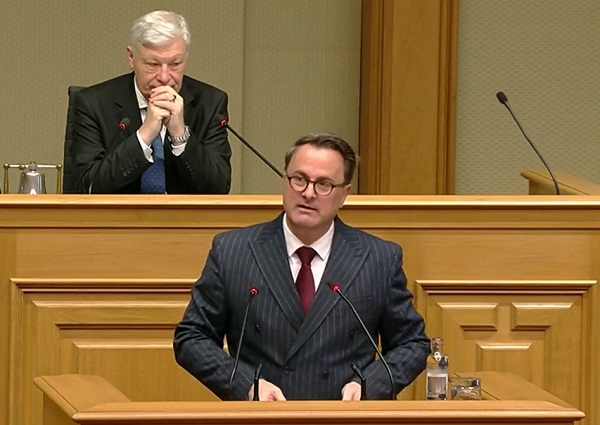 (Front) Xavier Bettel, Luxembourg's Deputy Prime Minister, Minister for Development Cooperation and Humanitarian Affairs; (behind) Claude Wiseler, President of the Chamber of Deputies;
Credit: Screenshot via CHD
(Front) Xavier Bettel, Luxembourg's Deputy Prime Minister, Minister for Development Cooperation and Humanitarian Affairs; (behind) Claude Wiseler, President of the Chamber of Deputies;
Credit: Screenshot via CHD
On Wednesday 12 February 2025, Luxembourg’s Deputy Prime Minister and Minister for Development Cooperation and Humanitarian Affairs, Xavier Bettel, delivered his annual address on development cooperation policy in the Chamber of Deputies (parliament).
Minister Bettel emphasised that development cooperation is a central pillar of Luxembourg’s foreign policy. He described it as both an expression of solidarity and an investment in the future, with its basis in shared values, notably democracy and respect for human rights. The minister stressed the importance of Luxembourg maintaining good relations with its partners. He emphasised that the goal of Luxembourg’s development cooperation policy was not to “impose our western values” but that any backtracking of certain rights or governance would be unacceptable and, in the absence of dialogue, could lead to a cessation of collaboration with certain countries.
He also touched on the EU Global Gateway initiative, which he recently discussed with fellow EU foreign ministers at a meeting in Poland - where he stated: “Investing in people is the best way to prevent conflicts”. He mentioned the need for sustainable financing models, not least in an era of multiple crises. He also assured that Luxembourg’s future-oriented financial centre would continue to play an important role. Minister Bettel added that Luxembourg’s development cooperation policy places particular emphasis on strengthening the local private sector in partner countries, notably through tools aimed at supporting young and innovative countries.
The minister recalled that Luxembourg invests 1% of its gross national income (GNI) in official development assistance (ODA), placing it among the five most ambitious development economies in this area. Provisional figures for 2024 are as follows: Luxembourg allocated €551 million to ODA, of which 28% was allocated within the framework of multilateral aid and 72% as part of bilateral aid.
At the bilateral level, Minister Bettel recalled the decision not to extend bilateral cooperation with Burkina Faso, Niger and Mali due to political developments in these countries (military coups, etc.). However, Luxembourg will continue to support the local population through multilateral institutions and continued support for local actors and NGOs active on the ground. He added that Luxembourg was seeking new partners and looking at regional hubs. He also highlighted Luxembourg’s continued support for Ukraine, with a focus on humanitarian aid, reconstruction aid and mine clearance.
In the context of increasing attacks on the multilateral order, the minister stressed the importance Luxembourg attaches to multilateralism, dialogue, solidarity and international law. He mentioned the decision of US President Donald Trump to cut development aid and leave certain programmes/organisations, which now need to prioritise and be more efficient.
Turning his attention to non-governmental development organisations (NGDOs), Minister Bettel noted two main issues for the sector: the consequences of the Caritas embezzlement scandal and the reform of state funding for awareness-raising and development education. Regarding Caritas, he expressed regret that Luxembourg’s development cooperation has lost a long-standing partner, with whom close collaboration had existed for many years. Concerning awareness-raising and development education, the minister highlighted efforts to strengthen cooperation between NGDOs and improve the impact of projects. He mentioned the creation of an NGDO "house", aimed at providing a space fit with offices and meeting rooms, etc., in order to make their work more visible and accessible.
Minister Bettel emphasised the important role played by NGDOs, which do "incredible work" on the ground and understand how to best meet local needs. These organisations are often present in countries where Luxembourg does not have diplomatic representation, while offering Luxembourgish society the opportunity to engage in the defence of human rights around the world. The minister thanked them for their commitment.
On the subject of humanitarian aid, Minister Bettel noted that the Grand Duchy has committed to devoting (since 2022) 15% of its ODA to humanitarian aid and has exceeded this target every year. For 2024, this amounted to €96 million, with a focus on food security and mine clearance (demining).
He noted that Luxembourg's development cooperation policy also looked at "forgotten crises" (e.g. in Sudan).
The minister also mentioned the role played by emergency.lu, Luxembourg’s rapidly deployable mobile satellite telecommunications platform. In 2024, the platform was deployed eleven times - in Chad, Niger, Burkina Faso, Panama (through the UN Refugee Agency - UNHCR), in the the Caribbean after Hurricane Beryl and in Mayotte. Moreover, Luxembourg Air Ambulance evacuated a young child and family members from Gaza to Albania for life-saving medical treatment; this supported efforts by the World Health Organization (WHO) to evacuate children and other civilians (in need of medical attention) from the Gaza strip.
Luxembourg MPs debated Minister Bettel's statement in parliament (in public session) later on Wednesday afternoon.








